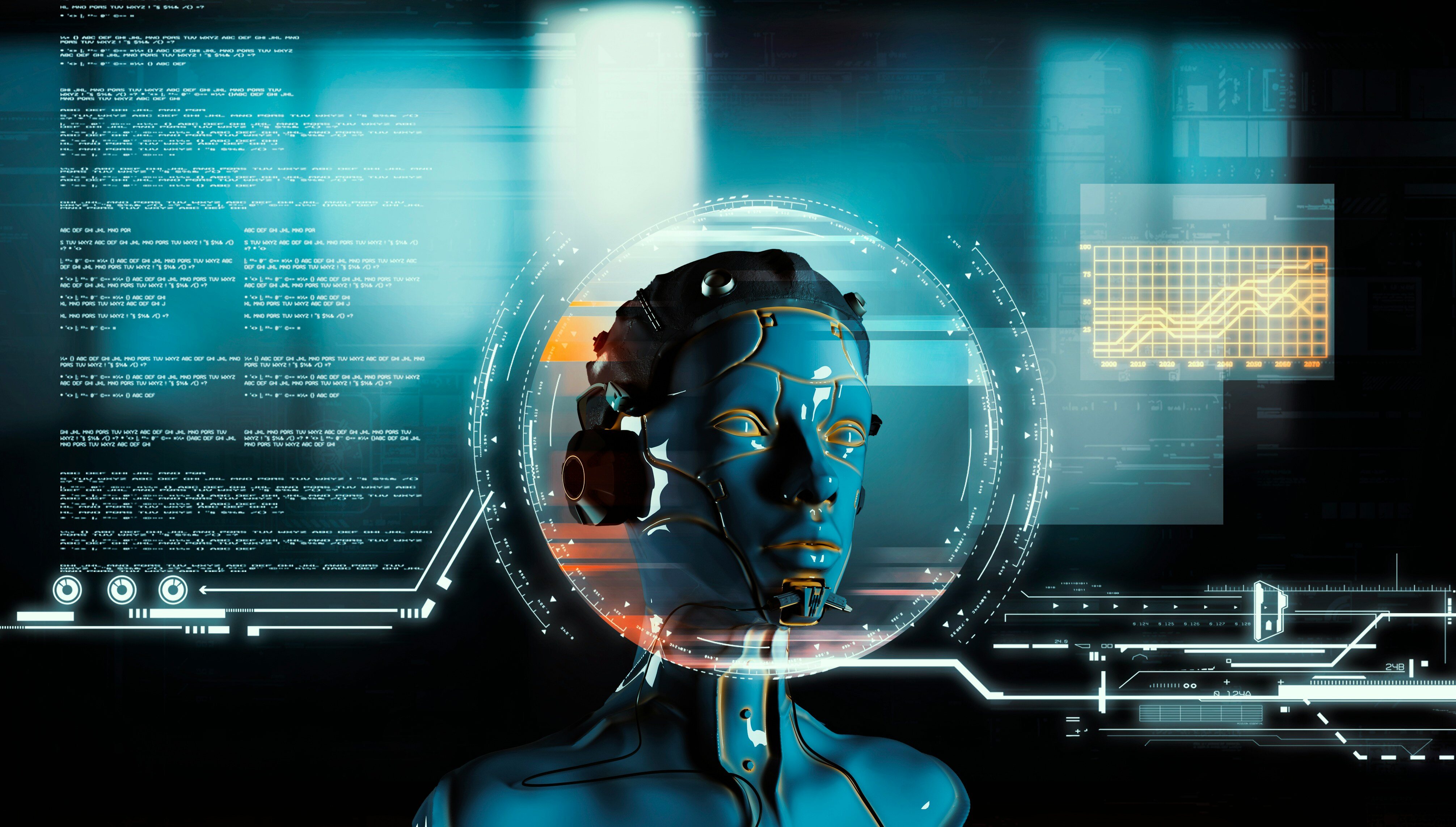Navigating the AI & ML Talent Gap
08 Jan, 202510 minsFinding the right AI talent acquisition strategy isn’t always easy. As demand for expertise ...

Finding the right AI talent acquisition strategy isn’t always easy. As demand for expertise in AI and ML grows, the competition to secure top candidates is only intensifying. Organizations like yours face increasing pressure to fill roles with the skilled professionals needed to drive growth, innovate, and stay ahead of the competition.
The AI talent gap is real, and it’s impacting businesses across industries. Without the right team in place, even the most promising AI projects can fall short. Companies are being forced to rethink how they attract, develop, and retain talent to meet their needs, and that requires a more strategic approach to AI talent acquisition.
In this guide, we’ll explore what’s behind the talent shortage and share actionable insights to help you overcome the challenges of sourcing and retaining the specialists your business needs to thrive.
The Talent Gap Unpacked
We live in a world driven by innovation, where new technologies emerge daily—and AI is at the forefront of this revolution. But while technological progress is accelerating, the pace of talent growth to meet these demands isn’t keeping up.
The demand for AI talent has surged dramatically. LinkedIn reports a 74% annual increase in AI & ML job listings since 2020. Yet, businesses continue to face significant challenges in sourcing professionals with the expertise to meet these needs. The shortage of skilled AI talent has made recruitment a pressing issue across multiple industries.
While AI integration is accelerating across industries—impacting everything from healthcare and finance to logistics and beyond—the gap between the demand for AI talent and the available supply is widening. This is especially true in areas like big data management and intelligent CRM systems, where organizations struggle to find professionals with the required deep expertise.
So, what’s causing this gap, and how big of an issue is it?
Why is There an AI & ML Talent Gap?
The sheer shortage of artificial intelligence and machine learning talent is a multifaceted issue, impacting businesses across sectors. Here’s a closer look at the key reasons behind this growing gap:
Rapid Technological Advancements
AL and ML technologies are advancing unprecedentedly, with demand for AI talent projected to increase by 30-35% this coming year. As new applications and use cases emerge, there simply are not enough professionals to fill the roles required to drive these innovations forward.
Educational Shortcomings
Although there are more AL and ML educational programs than ever before, the supply of qualified experts remains limited. A 2024 survey revealed that approximately 81% of IT professionals believe that they can use AI, but only 12% possess the solid skills needed to utilize it fully. This skill gap is compounded by the fact that most educational pathways don’t yet focus on the highly specialized skills businesses need.
Specialized Skill Sets in Demand
Roles like data scientists, machine learning engineers, and AI researchers require particular skills that take years to master. As a result, companies find it challenging to find candidates who are well-versed in the complex algorithms, programming languages, and data systems needed to power AI and ML solutions.
Intense Competition for Talent
The competition for AI and ML professionals is fierce. With the increasing demand for these specialists, businesses across multiple industries are scrambling to secure top talent. This shortage is expected to cause over 90% of organizations to face challenges related to IT skill shortages by 2026, particularly in areas like data analysis and machine learning.
Industry-Specific Knowledge Is Key
Beyond technical expertise, AI professionals need deep domain knowledge to apply their skills effectively across industries such as healthcare, finance, or logistics. Finding talent with both specialized technical skills and industry-specific knowledge remains one of the toughest recruitment challenges.
Why Does it Matter Going Into 2025?
2025 is shaping up to be a big year for AI. Its opportunities will be central to how businesses make decisions, improve customer experience, and stay ahead of global competition. But none of that is possible without the right people driving change.
Let’s take a look at why artificial intelligence and ML talent acquisition is more important than ever:
- AI is going mainstream: By the end of 2025, AI won’t just be something businesses experiment with. It will be embedded in nearly every part of operations, from automating tasks to enhancing customer interactions. To make this a reality, businesses need professionals with the right AI skills to turn those ideas into action.
- The hunt for talent is intensifying: As more businesses adopt AI, the demand for top talent will skyrocket. Companies will need effective AI talent acquisition strategies to find professionals with the right skills and who can keep up with rapid advancements in the field.
- Implementing AI is complex: Having the right tools is one thing, but successfully integrating AI into existing systems, managing large data sets, and scaling operations requires skilled experts. As businesses look for ways to make AI work seamlessly, these experts will be in high demand.
2025 is a decisive year, and if businesses don’t act fast to close the AI talent gap, they risk falling behind as others take the lead.
What’s Holding Businesses Back?
We know there’s a talent shortage in AI and machine learning, but simply acknowledging the gap isn’t enough. So, what's really holding businesses back from filling those roles? Is it just about waiting for talent to appear, or are there deeper barriers that prevent companies from securing the right people?
One of the biggest hurdles is access. AI talent is global, and many businesses don’t have the networks or strategies to reach the right candidates. Without strong connections or a clear understanding of where to look, organizations can find themselves locked out of an already competitive market.
The challenge is even greater for smaller businesses or those newer to AI. Competing with industry giants that offer eye-catching salaries, benefits, and opportunities can make it feel like the deck is stacked against them. And it’s not just about attracting talent—many businesses struggle with cross-border hiring logistics and the demand for remote work, making the process even more complicated.
5 Strategies to Bridge the Talent Gap
AI and ML are reshaping industries, but finding the right talent to drive innovation is becoming harder than ever. The talent shortage is real, and filling these critical roles isn't just about hiring—it’s about finding professionals who will truly make an impact. In 2025 and beyond, here are five strategies your organization can implement to bridge the AI and ML talent gap effectively.
1. Tap into Global Talent Pools to Expand Your Reach
AI and ML professionals are spread across the globe, and the talent isn’t limited to your immediate region. Cities like London, Berlin, Amsterdam, and Lisbon have vibrant tech ecosystems where skilled professionals are actively looking for new opportunities. These regions are home to strong tech sectors supported by local government initiatives and investment.
Why look to these tech hubs? It’s simple: the talent is there. Expanding your search to areas like Benelux, Germany, and the Nordic countries means accessing a diverse and highly skilled workforce. These regions offer a solid base of professionals with in-demand skills, making it easier to find the right candidates quickly.
Focusing on the right tech hubs is essential to overcoming the AI and ML talent gap. These locations have continuously evolving digital scenes, supported by strong academic and business foundations, making them ideal spots to find the specialists you need.
2. Upskill Your Existing Workforce
Not every solution requires going outside your company. Upskilling your existing workforce in AI, ML, and related technologies such as data engineering and deep learning can close the gap in the long term. Training your current employees ensures that your business stays competitive while developing a loyal, skilled workforce that understands your company’s culture and goals.
Focus on machine learning engineer skills, AI data management, and advanced software development techniques. Providing employees with learning resources, online courses, and certification programs can build up AI talent internally, reducing dependency on external hiring.
This not only helps your business address the AI talent gap, but it also promotes long-term growth, loyalty, and engagement within your workforce.
3. Retain Your Existing AI Talent
Bringing in great AI talent is just the start. Keeping them is the real challenge. With the demand for AI professionals so high, ensuring that your current employees stay is just as important. Competitive salaries are part of it, but so are clear career paths and growth opportunities.
Make sure your AI professionals feel valued by offering clear development pathways, promoting collaboration, and creating an environment where they can innovate and make an impact. A supportive work environment and regular feedback show that you’re committed to their success, not just their output. Providing flexible working options can also help ensure your team remains satisfied and loyal.
4. Use Flexible Hiring Models
Not every AI project requires a full-time employee. By adopting flexible hiring models, you can quickly find the right expertise for short-term needs without committing to long-term contracts. This can be particularly useful for niche AI skills like AI research or data engineering, where temporary or part-time roles might be all that’s needed.
Hiring on a flexible basis means you can scale your workforce to meet the demands of your business, hiring people when you need them most. This gives your company the flexibility to adjust based on project requirements, budget changes, or short-term needs without locking into permanent hires or paying for skills that are only necessary for a brief period.
5. Work with a Specialist Global Recruiter
Recruiting the right AI talent can be time-consuming, but working with a specialist recruiter can simplify the process. These recruiters are experts in AI recruitment, with a deep network of candidates who possess the exact skills you need. They’re not just filling jobs—they’re connecting you with professionals who can deliver results and contribute to your business’s success.
How a specialist recruiter can help:
- They have connections worldwide, meaning they can help you find candidates who might not be available locally.
- With their expertise, they can quickly identify top AI talent and streamline the hiring process, cutting down the time it takes to fill roles.
- A good recruiter works with you to craft a hiring strategy that fits your company’s culture, goals, and specific needs.
- They provide more than just resumes—they offer insights on salary trends, talent availability, and market conditions, ensuring your approach is aligned with the latest industry developments.
Partnering with a specialist recruiter ensures you get the right AI talent without wasting time or resources. This helps you meet your hiring goals efficiently and ensures you’re bringing in the AI and ML experts who truly fit your company’s needs.
Closing the AI Talent Gap: Strategies for 2025 Success
The AI talent gap is one of the most pressing challenges facing businesses today. As competition for skilled professionals intensifies, companies must act decisively to secure the talent they need. Addressing this challenge requires more than a quick fix; it demands strategic thinking, innovative recruitment methods, and a commitment to workforce development.
Whether it’s tapping into global talent pools, upskilling your current team, or adopting flexible hiring models, the solutions are within reach. Building a strong foundation of AI and ML talent will set your business apart, allowing you to drive innovation, remain competitive, and adapt to the rapid pace of technological change.
2025 presents a pivotal moment for businesses ready to close the talent gap and unlock the full potential of AI. The question is, are you prepared to take the steps necessary to secure the future of your organization?
Ready to Secure the AI and ML Talent You Need?
At MA, we connect global businesses with exceptional AI and ML talent. With over 40 years of experience in enterprise technology recruitment, we’re trusted specialists in finding the right people for complex roles.
Our international network spans Europe and the Americas, providing access to a diverse community of professionals ready to elevate your organization. Whether you need immediate expertise for critical projects or strategic hires for long-term success, we’re here to help you build a workforce that drives innovation and growth.
Get in touch with us today to find out how we can help you bridge the AI and ML talent gap.




